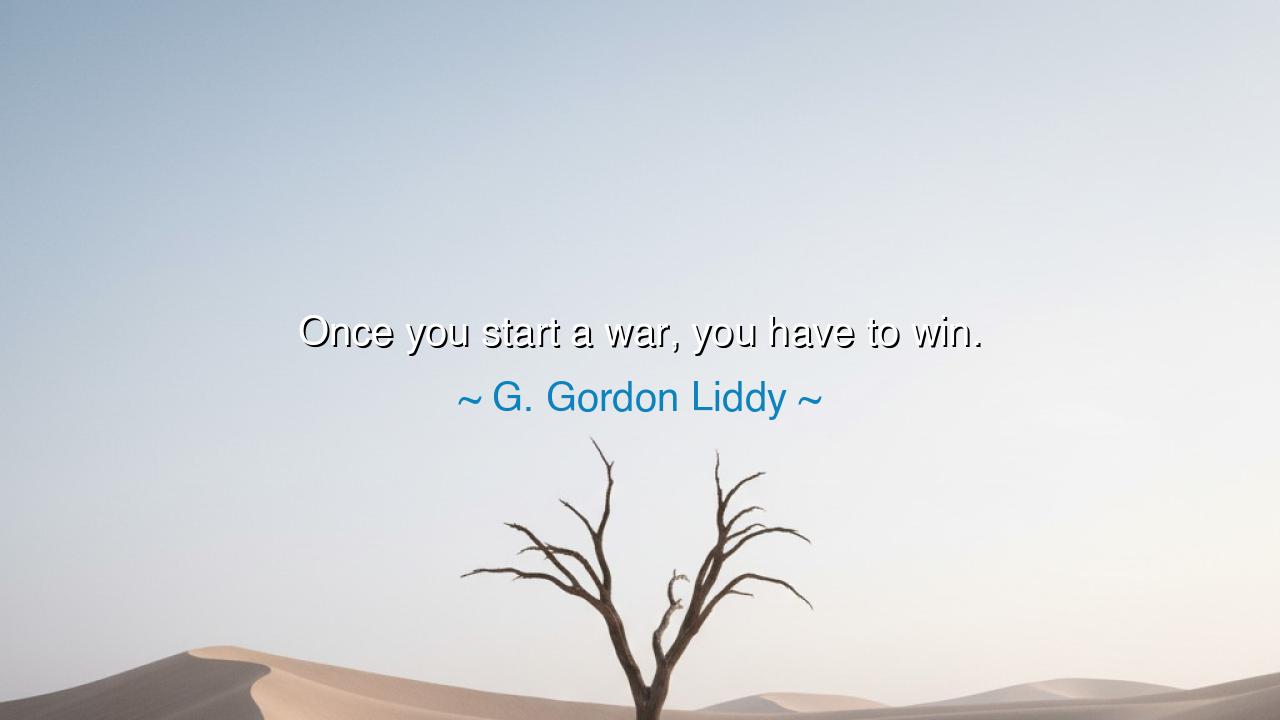
Once you start a war, you have to win.






Hear, O seekers of truth, the fierce and uncompromising words of G. Gordon Liddy, who declared: “Once you start a war, you have to win.” In this sharp and unyielding statement lies the recognition of war’s terrible nature: that it is not a game to be begun lightly, nor a quarrel that can be abandoned at will. To enter war is to awaken forces of chaos, blood, and destruction. And once awakened, they can only be subdued by victory, for failure brings not mercy but ruin.
The truth of this saying is plain in history. Consider the American Civil War. Once the Union and Confederacy had drawn swords, there could be no turning back. Compromise had been tried and failed. Words had lost their power. Only battle remained, and the survival of the nation hung in the balance. Had the Union faltered, the republic would have been split forever, slavery entrenched, and countless sacrifices wasted. Thus Lincoln, weary and burdened, pressed on to victory, knowing that only through triumph could the nation be reborn.
Or think on the fate of Napoleon, whose insatiable ambition plunged Europe into fire. Once he began his wars of conquest, he had no choice but to pursue victory after victory. For defeat meant not merely retreat, but the collapse of his empire and his exile to distant islands. His downfall at Waterloo shows the peril of this truth: when one begins a war, the road is narrow, and failure is not a gentle descent but a precipice into ruin.
Even in more recent times, the lesson has been repeated. In the long struggle of Vietnam, America entered the conflict with uncertain aims and divided resolve. The war was begun, but not with the clarity of purpose demanded by Liddy’s words. The result was tragedy: a drawn-out conflict that cost countless lives, sapped the nation’s spirit, and ended not in triumph but in bitter withdrawal. This is the danger of war without vision—once begun, it demands victory, and when victory cannot be secured, the cost is unbearable.
Liddy’s words, though hard, are not merely about nations but about the struggles of individuals. For in every human life there are battles we choose to fight—against fear, against injustice, against corruption, against our own weakness. Once we begin these wars, half-hearted effort is not enough. To turn back is to be crushed, but to persist with courage and discipline is to find victory. Every true struggle demands total commitment.
Yet let us not mistake his teaching as a call to hasten into war. On the contrary, it is a warning: weigh carefully before you begin, for once the sword is drawn, the only honorable path is to see it through to the end. To start a war is to gamble with blood, with destiny, with the lives of many. Therefore, one must be sure not only of the cause, but of the will to endure until victory is secured.
Therefore, O children of tomorrow, take this lesson: do not rush into battles of anger or ambition, whether on the scale of nations or in the quiet chambers of your own life. But when you have chosen to fight—when the cause is just and the need is clear—then fight with all your strength, and do not relent until the goal is won. For once you start a war, you have to win—and only through victory can the sacrifices be honored and the struggle redeemed.






CDNgoc Cao Diem
There’s an undeniable realism here — once you unleash destruction, you can’t retreat halfway. But I also hear arrogance in it, a dangerous confidence that assumes control over chaos. Wars rarely go as planned. The line makes me think about how easy it is to start conflicts and how impossible it becomes to stop them without paying unbearable prices. Maybe the wiser move is never to start one at all.
D-13- Pham Tran An Duy -7A10
This quote reminds me how absolute thinking dominates military and political strategy. It’s as if once a war begins, nuance dies — replaced by an obsession with victory. But what does ‘winning’ even mean? If both sides are left broken, can anyone truly claim triumph? It’s a statement that demands we question the purpose of war itself, not just the outcome.
TCpham thi chi
I can understand the ruthless practicality behind this line, but it also worries me. It implies that the moment war begins, morality, diplomacy, and compassion become secondary. Is that truly inevitable, or is it a failure of leadership? I’d like to ask: what if the cost of winning exceeds what’s worth saving? History is full of wars ‘won’ on paper but lost in every human sense.
THNgo Thi Tuyet Hong
This statement feels both pragmatic and chilling. It captures the cold logic of warfare — that once engaged, failure is not an option. But it also raises moral questions. Does the obligation to ‘win’ justify any method used to achieve victory? It makes me wonder whether this mindset fuels endless cycles of conflict, where nations prioritize dominance over dialogue simply because backing down feels like defeat.